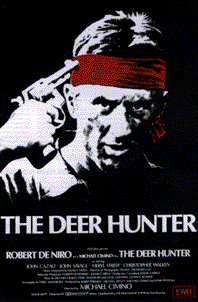 Study
Questions: Week Six
Study
Questions: Week Six Study
Questions: Week Six
Study
Questions: Week Six
Asian Nightmare: The Legacy of Vietnam
The Deer Hunter(1978)
Go Tell the Spartans(1978)
American military involvement in Vietnam began over a decade before American troops went ashore there in 1964. The United States aided the French before they were forced out of their former colony, and by the early 1960s, American military advisors were instructing, and at times fighting along side, the South Vietnamese forces. Always controversial, the War became increasingly unpopular as American casualties mounted and victory remained an elusive "light at the end of the tunnel." By the end of 1968, the war had forced a President from office and divided the country. When, for instance, two-thirds of the nation came to oppose the war, half of the opponents believed the War should have never involved the United States, while an equal percentage felt that the United States lacked the will to defeat the communist enemy.
Opinions on Vietnam were soon intertwined with attitudes about the 1960s in general; consequently, films about the war are, in most cases, films about the changes taking place in American society. Those who deplored the developments tended to support the goals of the War, and those who hoped to see revolutionary change in America opposed it.
As a result there was no consensus on how to understand or to dramatize the events in Vietnam. In 1968 John Wayne made The Green Berets, a film which used the conventions of WWII films to encourage support for the American effort. The film made money but took such a critical beating that Hollywood didn't release another film dealing with the War for a decade. Then, in 1978, The Deer Hunter and another film about Vietnam, Coming Home were major box-office hits and divided all the major Academy Awards between them. Since then Vietnam and its veterans have played prominent roles in numerous American films.
1. Why does The Deer Hunter film begin in the steel mill? In what specific, visual ways is the scene linked to later battle scenes? What theme is evident in these similar images?
2. What is the importance of the references to "sun dogs' and Natty Bumppo, The Deerslayer as the men leave the steel mill? How do the references connect to later events? To what degree is Mike a modern version of the Deerslayer? What does his abandonment of the hunt say about the fate of American myths during the 1960s and 1970s?
3. What is the importance of the wedding sequence? What moral and social strengths are evident in the ethnic community of Clairton? What weaknesses (think of Steve's mother and the priest, of the behavior of parents and mentors, of dangerous omens)?
4. In what way might Steve, Nick, and Mike each represent a separate and significant response to the disaster of the war in Vietnam?
5. What do you make of the Russian Roulette episode while the three are prisoners? It has no historical basis and thus is meant to symbolize the war rather than offer a realistic picture of it. How is it tied to Nick's fate?
6. What do Nick's mind, Steve's body, and Mike's idea of manhood have in common as a result of Vietnam?
7. How does Stan represent a darker (and weaker) side of Michael's ideals? Why do the two men fight over borrowing a pair of boots?
8. What are the prospects of Mike and Linda making a life together, and what does their future imply about the community of Clairton at large?
9. How does Nick's funeral serve as an ironic version of the earlier wedding?
10. How would you interpret the significance of the final scene in which the survivors sing "God Bless America"? Does it suggest the defense of a traditional idea of patriotism or a repudiation of it? This is not an easy question.
11. In Go Tell the Spartans, Major Barker is called "old World War II." How does this nickname and Baker's character suggest the crucial differences between the Second World War and the war in Vietnam?
12. What is the significance of calling the brutal South Vietnamese soldier "Cowboy"? How does the name link western myths and the American presence in Southeast Asia?
13. In what ways does the plot of the film turn the narrative conventions of the classic war film upside down? Consider the final shot of Baker and his men.
14. How does the intelligence officer assigned to Baker's unit reflect the new, corporate Army? How do Capt. Olivetti's career plans do the same? How do these characters embody the reason America failed in Vietnam?
15. What is the narrative function of Cpl. Coursey, the draftee who desires to know what the war in Vietnam is like? What is the thematic significance of his final lines (in the old French cemetery where he sees the wounded Vietcong soldier)?
16. What irony is evident in Baker's refusal to take "Cowboy's" advice concerning which villagers are members of the Vietcong?
17. Does Go Tell the Spartans condemn the war or the way the war is being conducted? What makes you choose your answer?
18. What characters and events in these two films anticipate the treatment of the Vietnam veteran as the alienated, embittered American in films of the 1980s.
19. In what ways do Maj. Barker in Go Tell the Spartans and Michael in The Deer Hunter mark the demise of the classic American hero?
20. How do these films reflect the loss of the American values espoused in film like The Caine Mutiny?